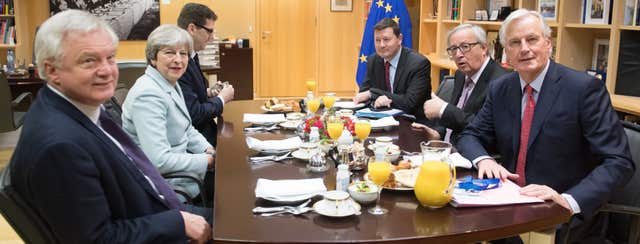The EU’s chief Brexit negotiator has urged European companies with commercial links to the UK to start preparing for increased “friction” in trade.
Despite plans for a transition period of around two years after the date of Brexit in March 2019, Michel Barnier said the “real transition period” had already begun and that firms need to get ready for the potential outcomes of British withdrawal from the EU.
He made clear that this included financial service providers, whose UK operations he warned will no longer benefit from the passport which currently allows them to market products freely in the European single market.
EU27 consultations. In The Hague today. Very good meeting with PM @markrutte: thank you for your warm support! Unity and mutual trust will be key in approaching the second phase of negotiations and moving forward. #Brexit pic.twitter.com/rNKp5UJh5w
— Michel Barnier (@MichelBarnier) January 9, 2018
Mr Barnier’s coments, in a speech to business leaders in Belgium, came after Brexit Secretary David Davis raised complaints about EU planning for a “no deal” Brexit.
In a letter to the Prime Minister, the Brexit Secretary said he would urge the EU to drop measures and guidance that could require UK companies to relocate to Europe or risk contracts being terminated in the event of no deal.
Scottish First Minister Nicola Sturgeon described Mr Davis’s “moaning” as “extraordinary” given the Government has set aside £3.7 billion to prepare to leave the EU without an agreement, and has repeatedly stated that “no deal is better than a bad deal”.
This letter is extraordinary. A govt intent on leaving EU & continually talking about prospect of ‘no deal’ moaning about EU preparing to treat UK as a non member and for the possibility of ‘no deal’. Unbelievable – or rather, increasingly believable from this inept UK government https://t.co/47CFxS99B7
— Nicola Sturgeon (@NicolaSturgeon) January 9, 2018
European Commission chief spokesman Margaritis Schinas said Brussels was “somehow surprised” at British anxiety about its preparations for a scenario announced by the UK Government itself.
Speaking in Brussels, Mr Barnier restated the Commission’s proposal for a transition period lasting until December 31 2020.
But he added: “Having said that, the real transition period has already started. It is my responsibility to tell you the truth.
“Commercial relations with a country which does not belong to the EU necessarily involves friction. For example, with VAT declarations. Or with the import of living animals or products of animal origins, which are subjected to systematic controls at the EU border when they come from a third country.”
Describing the “methodical preparation” for Brexit already being undertaken at the port of Zeebrugge, Mr Barnier said: “It is important that every business should analyse with clarity its exposure to the UK and be ready to adapt its logistical networks, its supply chains and its contractual clauses, including in the area of financial services.”
Mr Barnier said that the successful conclusion of phase one of Brexit negotiations last month meant that the risk of a disorderly withdrawal had receded, but added: “We must remain ready to deal with all options.”

And he warned that, while such an agreement could include regulatory co-operation on financial services, the EU would not be willing to give up the Single Rulebook drawn up in the wake of the 2008 financial crisis.
Rejecting any suggestion that he was seeking “punishment or revenge” of the UK, he said: “A country which withdraws from this very specific framework and from its consistent application by national authorities takes on the ability to diverge, but at the same time loses the benefits of the single market.
“Its financial services providers will not be able to benefit any longer from a passport into the single market, nor from a system of general equivalence of norms.”
The EU will have the power to deem UK regulations “equivalent” to its own if it is confident they do not threaten financial stability, said Mr Barnier.
But he added: “Let’s not have a short memory. The financial crisis is not so long ago. It cost us dear. It destroyed value and millions of jobs and caused much social pain.”
Here’s the leaked letter from Davis to May about the threat to British jobs from EU “no deal” preparations pic.twitter.com/EFbzu3vhzC
— Jim Pickard (@PickardJE) January 8, 2018
In the letter obtained by the Financial Times, Mr Davis warned Mrs May that EU agencies have issued guidance to businesses stating that the UK will become a “third country” after Brexit in March 2019, with no reference to a future trade deal sought by both sides.
He said he would urge the European Commission’s Brexit taskforce to withdraw the statements made so far, in light of the agreement reached in December to begin trade negotiations.
But Mr Schinas said the EU “don’t feel there is anything new for us to say” about a transition period or trade deal, “since this is part of the next stage of the negotiation”.
Asked if the EU’s work breached Britain’s rights, Mr Schinas replied: “No.”
Meanwhile, the SNP, Liberal Democrats, Green Party and Plaid Cymru accused Labour of an “abdication of responsibility” for refusing to join them in backing single market membership after Brexit.
Following a cross-party meeting in Parliament, they criticised Jeremy Corbyn’s pursuit of a “jobs-first” Brexit, arguing it was impossible without backing single market membership.






